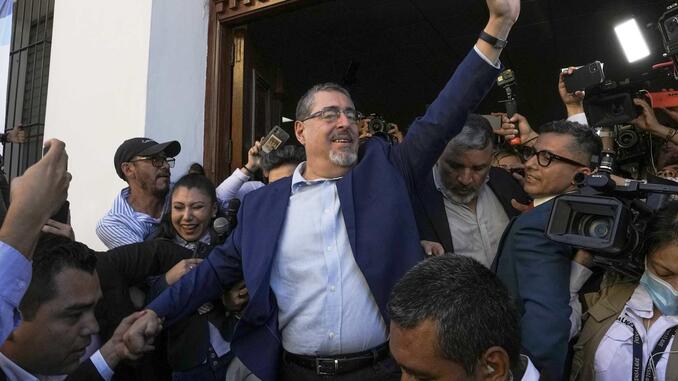
On August 20, Bernardo Arévalo overwhelmingly won Guatemala’s presidential election on a message of anti-corruption and social progress. His victory, which turned out to be a landslide, was considered a longshot and was run in an unconventional way. His campaign ran on a shoestring budget out of a garage, and the candidate and his staff rode around the countryside in their own personal vehicles. It was a contrast to typical campaigns of the Guatemalan political class who sport the trappings of large budgets. His election brings hopes of reform to a Guatemala full of corruption, bad government, and crime that drive hordes of its people out of the country every year. But the battle for those changes ig.
Arévalo’s message and surge in popularity was met with fierce attacks from the country’s traditional ruling elites, that despite his overwhelming victory, threaten to kill his effectiveness leading the country. Those attacks look to have crippled his Semilla (Seed Movement) party with trumped-up legal charges over the party’s handling of signatures back in 2019. Those charges, brought on by Attorney General Consuelo Porras—who is sanctioned by the U.S. State Department for “repeatedly obstruct(ing) and undermin(ing) anticorruption investigations in Guatemala to protect her political allies”—were met with international outcry. (Porras is seen as closely aligned with Arévalo’s opponent, former first lady Sandra Torres who affiliates herself with the political establishment.)
After Arévalo established himself as a major candidate by finishing second in first-round election results, forcing a runoff with Torres, Attorney General Porras announced the suspension of the Semilla party from further participation in the election. The announcement was met by Arévalo and Semilla supporters taking to the streets in protest. Under Guatemalan law authorities cannot suspend parties during an election. The morning after the suspension, Semilla offices were raided by police just before the country’s Constitution Court struck down the suspension. Arévalo called the raids a “flagrant demonstration” of the “political persecution” he faces.
In discussing the suspension and raids of the Semilla party, Secretary-General of the Organization of American States Luis Almagro stated, “This is an electoral process that has suffered clear interference of internal actors that hindered its normal development.”
When Arévalo went on to win the election in the second round with 68 percent of the vote to Torres’s 39 percent, the Semilla party was once again suspended. Currently the situation remains fluid with further developments likely to come, but it is certain Arévalo will be Guatemala’s next president, albeit, likely politically crippled. The country’s current president, Alejandro Giammattei—who was unable to run once again—has promised an “orderly and transparent transition.”
U.S. Secretary of State Anthony Blinken released a statement saying the U.S. was “concerned with continued actions by those who seek to undermine Guatemala’s democracy. Such anti-democratic behavior, including efforts by the Public Ministry and other actors to suspend the President-elect’s political party and intimidate election authorities, undercuts the clear will of the Guatemalan people and is inconsistent with the principles of the Inter-American Democratic Charter.”
For some, Blinken’s statement may seem ironic coming from a government that organized a coup to oust Guatemala’s first democratically elected president, Juan José Arévalo, in 1954. If Juan José Arévalo’s last name sounds familiar, it is because he was Bernardo Arévalo’s father. Today, however, may be bittersweet for the president-elect, coming to power with the full support of the United States. His father was credited in beginning what became known as the “democratic spring” in Latin America. At the end of Bernardo’s campaign, supporters held signs harkening back to that era, saying “the spring will flower again.” Arévalo has stated his government would work with the U.S. to crack down on graft and promote trade and investment to help cut the flow of migrants.
It is easy to see why Bernardo Arévalo’s presidency poses such a risk to the corruption plaguing Guatemala. He wants to replace politically connected cronies in state offices and agencies, end the skimming from government contracts, and tackle the soaring costs of electricity and healthcare. He is trying to break the political machines backed by big donors and organized crime that have been a root cause of the violence and poverty driving millions to flee the country to seek a better life somewhere else. Many end up as illegal aliens in the United States.
It will certainly be a Sisyphean task, but Arévalo seems to be a pragmatic politician who demonstrates an understanding of the road ahead. Despite the serious blows that look to cripple his ability to lead, there is room for optimism. Will Freeman, a fellow for Latin America studies at the Council on Foreign Relations writes in the Los Angeles Times, “There’s still reason to hope that the president-elect can fulfill some of his promises. Simply by refusing to award contracts and jobs based on political connections, he could reduce rampant corruption. Without control of the presidency lining their wallets—and funding their campaigns—machine politicians in Congress may realize they are at risk of losing reelection and change their tune.”
Guatemala was once a bellwether for Latin America. When its citizens ousted a military dictator in 1944, it set off a wave of democratization across Latin America. If Bernardo Arévalo can overcome the serious obstacles his opponents are throwing his way and implement his commonsense centrist agenda, perhaps, just maybe, Guatemala can drastically improve the lives of its people, and even return to its once bellwether role.
